Poland’s strength in Solidarity
Twenty years after the union was legalised, Poland steers a steady economic course.
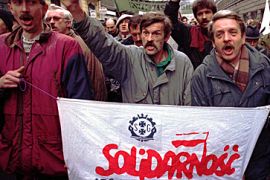
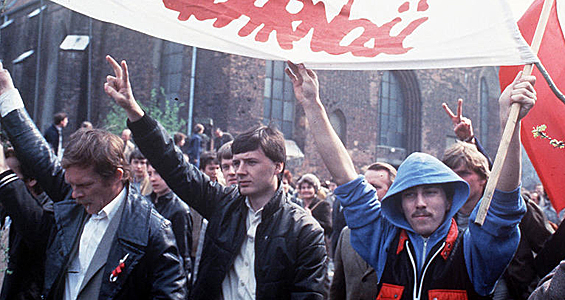 |
| Solidarity was the first trade union in the Communist bloc independent of the party [AP] |
Twenty years ago, Solidarity, Poland’s underground trade union, was legalised in a process which ultimately helped lead to the fall of the Berlin Wall and the collapse of the Soviet Union.
Al Jazeera’s Mark Seddon looks at the roots of the organisation and how present-day Poland is weathering the global recession.
Two decades on from the legalisation of Solidarity and the fall of Communism, something is stirring in Poland.
Those former Eastern-bloc countries who embraced the free market with greatest enthusiasm, such as Hungary, Estonia and Latvia, now face a deepening economic crisis as the cold winds of global recession sweep through their economies.
Poland on the other hand, as one of the countries who either have not or could not take on the free market model with such enthusiasm, appears to be bearing up well.
While Poland’s economy is set to slow next year, it will grow faster than that of the European Union as a whole.
The country’s good fortune appears to rest on the fact that its financial institutions are not strongly tied to global financial institutions.
Its banks rely on deposit, rather than credit operations, for their core business.
Added to this, is the fact that wages have grown while income tax has been reduced.
Poland today is in an altogether more resilient place, partly because it remains an outsider, but an outsider that has a very good chance, because of its relative strength, of becoming an insider.
Becoming an insider means becoming a member of the eurozone, and this remains the dream for many in Poland.
Dissident activity
Such aspirations seemed unthinkable twenty years ago this week when the ban on Solidarity was lifted.
Founded in September 1980 in the Lenin, now Gdansk shipyard, on Poland’s northeast Baltic coast, Solidarity was the first free trade union in the old East European Communist bloc.
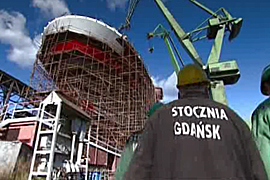 |
| Solidarity was born amongst the workers of the Gdansk shipyard |
For those born in the years since, it may seem extraordinary that the only trade unions workers could join were those organised by the Communist party.
But the idea of free trade unions was anathema to Eastern Europe’s rulers, in large part because they could not be controlled.
The Lenin shipyard had long been a hot bed of dissident activity.
When I recently visited the shipyard, a huge memorial still dominated the entrance, erected after the government of Wladyslaw Gomulka turned its guns on striking shipyard workers in December 1970.
It was the later strikes of the late 1980s which propelled Lech Walesa, a young shipyard electrician, into the international spotlight, and the legalisation of the union in 1989 sent shockwaves across Eastern Europe.
The decision ultimately paved the way for the fall of the Berlin Wall and the collapse of the Soviet Union, while Walesa went on to win the Nobel Peace Prize and to lead his country as president.
Elder statesman
To this day, his office in the old Hanseatic city of Gdansk is framed by the giant gantries of his old shipyard.
When I went to see him late last year, Walesa was less the trade union activist, more the elder statesman.
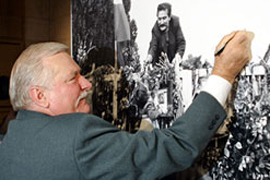 |
| Walesa signs a photo of himself at the gate of the Gdansk shipyard during a strike [AFP] |
He had presided over the creation of a democratic Poland, which had turned its back on Communism and the Warsaw Pact and embraced the EU and Nato.
Walesa’s old shipyard has not prospered in the new free market conditions, still less the neighbouring yards at Gdynia and Szczecin.
Not that Walesa seemed particularly perturbed at their impending closure.
Under EU rules, subsidies to the yards were no longer allowed, rules that Walesa believed that Poland had to embrace if it were to be taken seriously.
In the event, Gdansk’s history and its relative strength in comparison to its ailing neighbours was enough to give the yard breathing space.
But there was no mistaking the sullen mood of shipyard workers as they left the gates on the day we were filming.
Televison crews were automatically associated with “bad news” and few workers would stop and talk.
‘Brain drain’
This, then, was the downside of Poland’s democratic revolution.
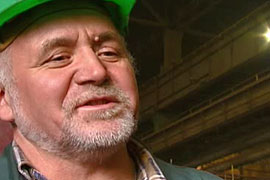 |
| Few shipyard workers are willing to stop and talk to television crews in these troubled times |
Instead of tens of thousands of workers hammering and welding the ships of tomorrow, just a few thousand remained in what had traditionally been a one industry town.
Indeed, many of its old, labour intensive industries have contracted or closed and those that remain, such as coal-mining, are under heavy pressure from environmental lobbyists.
As Europe’s biggest coal producer, and the most dependent of all EU member states on coal-powered electricity, it is not popular with Green groups.
Meanwhile, Poland’s accession to the EU and the opening of the borders led to another major movement of workers, with Poles finding work in countries such as Germany and Britain.
The consequent “brain drain” for the country is only just being levelled out with many of those workers now preferring to return to their native land.
Boring best
Whether these negatives will outweigh the positives, such as the strength of its financial institutions and the possible accession to the eurozone, remains to be seen.
Whatever the future, there is no doubt that 20 years on Poland is a country that has undergone dramatic change.
Walesa told me that never in his wildest imagination could he have predicted both the speed of the collapse of Communism and all of the momentous changes that would follow.
“In the future, maybe, we will in Poland be a boring but stable country in the middle of Europe,” he said.
There will be many in Poland who may simply say “yes” to that.